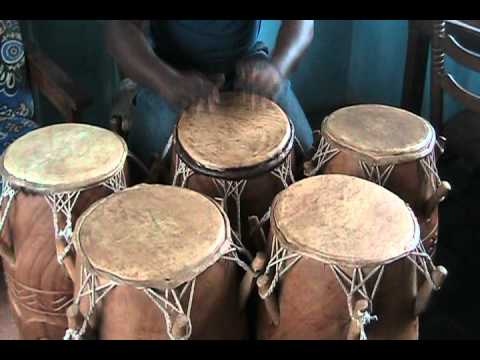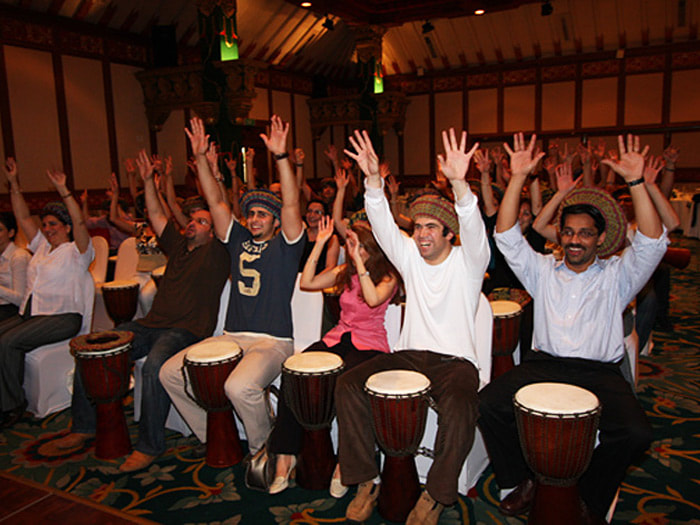Drumming is as fundamental a form of human expression as speaking, and likely emerged long before humans even developed the capability of speech as a form of communication. The first sound we ever heard while still in our mother’s womb, was the beating of her heart, and the rhythm of her breath. No matter our race, gender, age, religion or belief system, this common experience exists for all human beings.
When newcomers are first introduced to drumming, they often say “oh, I don’t have any rhythm,” in an attempt to excuse themselves for their imagined inadequacy.
The truth is: We All have Rhythm!
Rhythm is our natural inheritance. It exists in our bodies, our hearts, our breath. It exists in the vibration of atoms, the cycles of the seasons, the ticking of clocks, the orbit of the earth. There is no part of creation that is without rhythm! Drumming is a practice that spans the globe and has a presence in every culture. It has been used for centuries in rituals, ceremonies, communication, rites of passage, music and dance, celebration, healing, community building, and cultural events.
Drum therapy is an ancient approach that uses rhythm to promote healing and self-expression. From the shamans of Mongolia to the Minianka healers of West Africa, therapeutic rhythm techniques have been used for thousands of years to create and maintain physical, mental, and spiritual health.
Current research is now verifying the therapeutic effects of ancient rhythm techniques. Recent research reviews indicate that drumming accelerates physical healing, boosts the immune system and produces feelings of well-being, a release of emotional trauma, and reintegration of self.
Other studies have demonstrated the calming, focusing and healing effects of drumming on Alzheimer’s patients, autistic children, emotionally disturbed teens, recovering addicts, trauma patients, and prison and homeless populations. Research results have demonstrated that drumming is an effective treatment for stress, fatigue, anxiety, hypertension, asthma, chronic pain, arthritis, mental illness, migraines, cancer, multiple sclerosis, Parkinson’s disease, stroke, paralysis, emotional disorders and a wide range of physical disabilities.
When newcomers are first introduced to drumming, they often say “oh, I don’t have any rhythm,” in an attempt to excuse themselves for their imagined inadequacy.
The truth is: We All have Rhythm!
Rhythm is our natural inheritance. It exists in our bodies, our hearts, our breath. It exists in the vibration of atoms, the cycles of the seasons, the ticking of clocks, the orbit of the earth. There is no part of creation that is without rhythm! Drumming is a practice that spans the globe and has a presence in every culture. It has been used for centuries in rituals, ceremonies, communication, rites of passage, music and dance, celebration, healing, community building, and cultural events.
Drum therapy is an ancient approach that uses rhythm to promote healing and self-expression. From the shamans of Mongolia to the Minianka healers of West Africa, therapeutic rhythm techniques have been used for thousands of years to create and maintain physical, mental, and spiritual health.
Current research is now verifying the therapeutic effects of ancient rhythm techniques. Recent research reviews indicate that drumming accelerates physical healing, boosts the immune system and produces feelings of well-being, a release of emotional trauma, and reintegration of self.
Other studies have demonstrated the calming, focusing and healing effects of drumming on Alzheimer’s patients, autistic children, emotionally disturbed teens, recovering addicts, trauma patients, and prison and homeless populations. Research results have demonstrated that drumming is an effective treatment for stress, fatigue, anxiety, hypertension, asthma, chronic pain, arthritis, mental illness, migraines, cancer, multiple sclerosis, Parkinson’s disease, stroke, paralysis, emotional disorders and a wide range of physical disabilities.
Some Examples of the Benefits of Group Drumming, Proven in Human Clinical Research
- Reduce Blood Pressure, Anxiety/Stress: A 2014 study published in the Journal of Cardiovascular Medicine enrolled both middle-aged experienced drummers and a younger novice group in a 40-minute djembe drumming sessions. Their blood pressure, blood lactate and stress and anxiety levels were taken before and after the sessions. Also, their heart rate was monitored at 5 second intervals throughout the sessions. As a result of the trial, all participants saw a drop in stress and anxiety. Systolic blood pressure dropped in the older population post-drumming.
- Regrows Brain Matter: A 2014 study published in the Journal of Huntington’s Disease found that two months of drumming intervention in Huntington’s patients (considered an irreversible, lethal neurodegenerative disease) resulted in “improvements in executive function and changes in white matter microstructure, notably in the genu of the corpus callosum that connects prefrontal cortices of both hemispheres.” The study authors concluded that the pilot study provided novel preliminary evidence that drumming (or related targeted behavioral stimulation) may result in “cognitive enhancement and improvements in callosal white matter microstructure.”
- Reduced Pain: A 2012 study published in Evolutionary Psychology found that active performance of music (singing, dancing and drumming) triggered endorphin release (measured by post-activity increases in pain tolerance) whereas merely listening to music did not. The researchers hypothesized that this may contribute to community bonding in activities involving dance and music-making.
- Improves Our Immune System. Reduces Cortisol, and Boosts Two Types of Cancer Fighting Cells: A 2001 study published in Alternative Therapies and Health Medicine indicates that drumming circles boost the immune system. Led by renowned cancer expert Barry Bittman, MD, the study demonstrates that group drumming actually increases cancer-killing cells, which help the body combat cancer as well as other viruses, including AIDS. According to Dr. Bittman, “Group drumming tunes our biology, orchestrates our immunity, and enables healing to begin."
- Reduce Emotional Distress: A powerful 2001 study published in the journal Evidence-Based Complementary and Alternative Medicine found that low-income children who enrolled in a 12-week group drumming intervention saw multiple domains of social-emotional behavior improve significantly, from anxiety to attention, from oppositional to post-traumatic disorders.
- Transcendent Experiences: A 2004 study published in the journal Multiple Sclerosis revealed that drumming enables participants to go into deeper hypnotic states, and another 2014 study published in PLoS found that when combined with shamanistic instruction, drumming enables participants to experience decreased heart rate and dreamlike experiences consistent with transcendental experiences.
Note: Sources used in this website are given credit whenever possible: The text contents from this page have been taken from a source on the internet. There was no name to this work and so credit cannot be given.. If you are the author pls contact RRR admin to add your name.
|
"A very big THANK YOU to Ricarda Raabe of Lust auf Trommeln for the extensive work to translate this page into the German language to allow the benefits of group percussion to extend the German speaking population... "
A systematic review on the effects of active participation in rhythm-centred music making on different aspects of health
|

